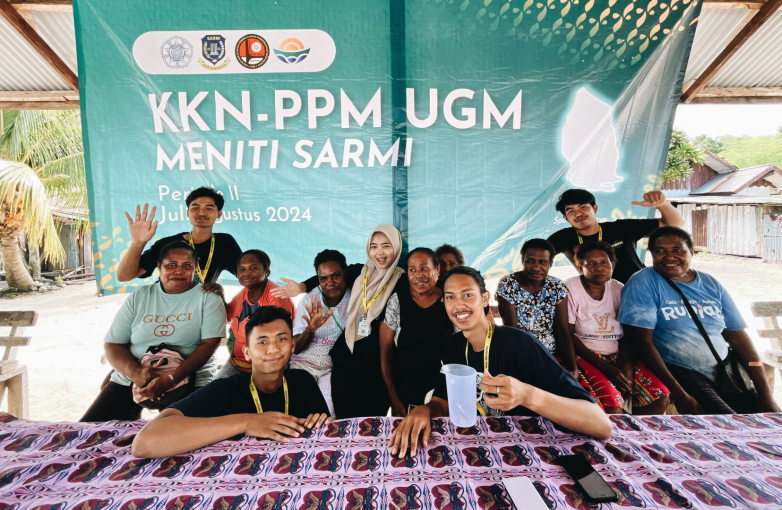
Students from the Department of Socio-Economics of Agriculture, Faculty of Agriculture UGM—Fakhry Ahmad Ahzami, Maheswari Dian Argani, and Muhammad Febrian Arrifandhi—are currently undertaking their Community Service Program (KKN) in Kampung Lama and Kampung Baru, Pulau Liki, Sarmi Regency, Papua. This KKN program, running for approximately 50 days, is themed “Realizing the Self-Reliance of Indonesia’s Easternmost Islands: Student Community Service for Empowering Local Communities through Strengthening Local Communities and Utilizing Natural & Human Resources for Sustainable Development.”
During their KKN, the team has implemented various programs focused on community empowerment and local resource utilization. Key activities include creating eco-enzyme from organic kitchen waste, hydroponic vegetable maintenance, socializing the creation of local souvenirs unique to Pulau Liki (Tapo), educating on soap production from coconut oil, and showcasing local natural products from Pulau Liki. One of the most memorable moments was the warm welcome the team received from the local community, which included traditional songs, dances, and a ceremonial greeting that strengthened the bond between the students and the island’s residents.
Throughout the KKN, the team faced cultural differences between Java and Papua. They adapted by asking questions, observing, and learning about local customs. The Pulau Liki community showed great enthusiasm for the programs and actively participated in them.
This KKN activity aligns strongly with several Sustainable Development Goals (SDGs). SDG 1: No Poverty is reflected in the efforts to improve community welfare through the utilization of local resources and new knowledge. SDG 12: Responsible Consumption and Production is represented by the creation of eco-enzyme and soap, promoting waste management and sustainable material use. SDG 8: Decent Work and Economic Growth is seen in the socialization of local souvenir production and the exhibition of natural products, supporting creative economy development and community empowerment.
The Community Service Learning Program of Universitas Gadjah Mada serves as an important platform for applying academic knowledge in real-world settings. It is hoped that through this KKN, the community not only gains new knowledge but also becomes a key player in the development of existing programs, ensuring their sustainability and growth. For future KKN participants, it is advised to choose a team and location aligned with their interests and studies, and to build relationships and skills such as leadership and teamwork that will be valuable during the KKN.
Author: Adhika Hafizh Prasada, S.P.
Admin of the Website for the Department of Agricultural Socio-Economics, Faculty of Agriculture, UGM
